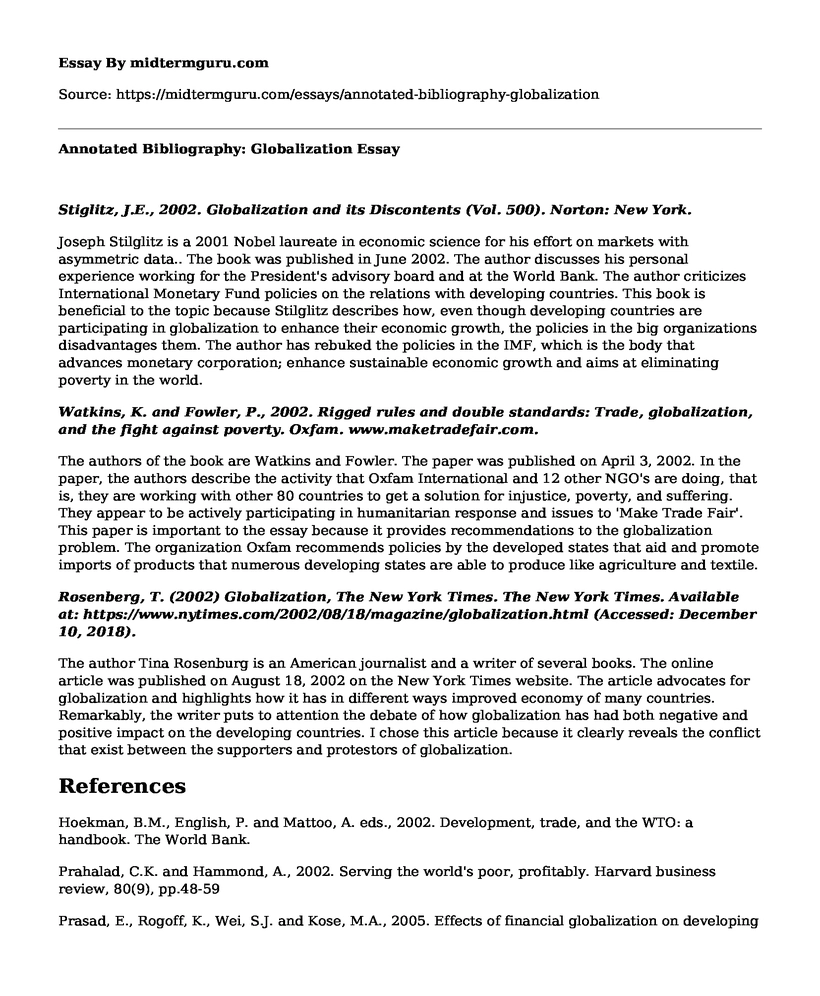Stiglitz, J.E., 2002. Globalization and its Discontents (Vol. 500). Norton: New York.
Joseph Stilglitz is a 2001 Nobel laureate in economic science for his effort on markets with asymmetric data.. The book was published in June 2002. The author discusses his personal experience working for the President's advisory board and at the World Bank. The author criticizes International Monetary Fund policies on the relations with developing countries. This book is beneficial to the topic because Stilglitz describes how, even though developing countries are participating in globalization to enhance their economic growth, the policies in the big organizations disadvantages them. The author has rebuked the policies in the IMF, which is the body that advances monetary corporation; enhance sustainable economic growth and aims at eliminating poverty in the world.
Watkins, K. and Fowler, P., 2002. Rigged rules and double standards: Trade, globalization, and the fight against poverty. Oxfam. www.maketradefair.com.
The authors of the book are Watkins and Fowler. The paper was published on April 3, 2002. In the paper, the authors describe the activity that Oxfam International and 12 other NGO's are doing, that is, they are working with other 80 countries to get a solution for injustice, poverty, and suffering. They appear to be actively participating in humanitarian response and issues to 'Make Trade Fair'. This paper is important to the essay because it provides recommendations to the globalization problem. The organization Oxfam recommends policies by the developed states that aid and promote imports of products that numerous developing states are able to produce like agriculture and textile.
Rosenberg, T. (2002) Globalization, The New York Times. The New York Times. Available at: https://www.nytimes.com/2002/08/18/magazine/globalization.html (Accessed: December 10, 2018).
The author Tina Rosenburg is an American journalist and a writer of several books. The online article was published on August 18, 2002 on the New York Times website. The article advocates for globalization and highlights how it has in different ways improved economy of many countries. Remarkably, the writer puts to attention the debate of how globalization has had both negative and positive impact on the developing countries. I chose this article because it clearly reveals the conflict that exist between the supporters and protestors of globalization.
References
Hoekman, B.M., English, P. and Mattoo, A. eds., 2002. Development, trade, and the WTO: a handbook. The World Bank.
Prahalad, C.K. and Hammond, A., 2002. Serving the world's poor, profitably. Harvard business review, 80(9), pp.48-59
Prasad, E., Rogoff, K., Wei, S.J. and Kose, M.A., 2005. Effects of financial globalization on developing countries: some empirical evidence. In India's and China's recent experience with reform and growth (pp. 201-228). Palgrave Macmillan, London.
Rosenberg, T. (2002) Globalization, The New York Times. The New York Times. Available at: https://www.nytimes.com/2002/08/18/magazine/globalization.html (Accessed: December 10, 2018).
Rudra, N., 2002. Globalization and the decline of the welfare state in less-developed countries. International Organization, 56(2), pp.411-445.
Sklair, L., 1999. Competing conceptions of globalization. Journal of World-Systems Research, 5(2), pp.142-163.
Stiglitz, J.E., 2002. Globalization and its Discontents (Vol. 500). Norton: New York.
Watkins, K. and Fowler, P., 2002. Rigged rules and double standards: Trade, globalization, and the fight against poverty. Oxfam. www.maketradefair.com.
Cite this page
Annotated Bibliography: Globalization. (2022, Nov 03). Retrieved from https://midtermguru.com/essays/annotated-bibliography-globalization
If you are the original author of this essay and no longer wish to have it published on the midtermguru.com website, please click below to request its removal:
- Mid Term Questions on Globalization: Marx, Giddens, Weber
- Essay on Roles of Financial Institutions in Our Economy
- Comparison of Gross Domestic Product - Economics Paper Example
- Baby Pram Breaks, Kylie's Nanny in the Line of Fire - Case Study
- U.S. Immigration: Assimilation, Culture, and Economics - Essay Sample
- THE US: Capitalist Democracy at Its Best - Essay Sample
- Quilombola Pottery: Globalization, Economic Anthropology, and Sustainability - Essay Sample







